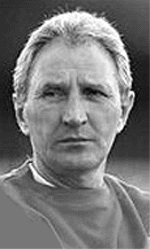THE MOSSLEY AFC 'HALL OF FAME'

Born in Sheffield on 13th November 1943 former England Youth International Howard Wilkinson had a fairly ordinary playing record, he made only 22 appearances in his time at Sheffield Wednesday but after his transfer to Brighton he clocked up 116 appearances with the south coast club. His managerial career started at Boston United as player-manager, and during this time he gained a degree in physical education at Sheffield University. He also spent time during this period teaching at Abbeydale School in Sheffield and led Boston to two successive Northern Premier League titles.
In December 1976 he was enticed away from Boston to join Mossley as Player-Manager and helped the Lilywhites climb the Northern Premier League table to finish 9th being unbeaten in 19 successive games in the bargain. The side also won the Manchester Senior Cup beating Droylsden 12-3 on aggregate in the final. Wilkinson made 30 appearances for Mossley scoring just one goal. He left Mossley at the end of the season but not before taking the unprecedented step of appointing his own successor at Seel Park, the now England under 15's manager Dick Bate.
Wilkinson was appointed FA regional director of coaching for the North East before being tempted back into the pro game by Notts County. He managed England' s semi-professional team and in 1982 he became the coach for the England Under-21 team. At Notts County he started as assistant-manager to Jimmy Sirrel, although his role was effectively that of manager. He managed Notts County in the middle of three seasons they spent in the First Division during the early eighties and achieved 15th place in the table on very low gates. He moved to Sheffield Wednesday in the 1983 close-season and in 1983-84 took Wednesday back to the First Division in his first season.
Wednesday were close to winning the Second Division championship, but it was Chelsea who eventually took the title which went to the last game of a thrilling season. His Wednesday team became formidable First Division opponents and the first season back 1984-85 included memorable league victories at both Anfield and Old Trafford. The following season 1985-86 Wednesday finished 5th in the league and had it not been for the appalling scenes at the Heysel stadium, which led to a ban on English clubs, Wednesday would have played in Europe. In 1986-87 & 1987-88, they finished in a mid-table position in the First Division and it was two months into the 1988-89 season when he left the club to manage Leeds United.
It' s a great credit to Wilkinson that the performance of his teams always seemed to exceed the sum of their individual abilities. During his time as manager, the Wednesday board were reluctant to speculate too heavily in the transfer market and the club' s wages structure proved a deterrent to some players who might otherwise have joined the club.
It remains a matter of debate, that if Wilkinson had been given the kind of budget that was later afforded to Atkinson and Francis, he might have enjoyed the success he eventually had at Leeds. On his arrival at Elland Road, he improved the fitness and discipline of the existing players and staved off relegation to Division 3 in his first season, but with the inspired signing of Gordon Strachan, and the arrival of defensive solidity in the shape of Chris Fairclough and Mel Sterland, Leeds looked set to make a promotion push. The escape bid got a major shot in the arm with the biggest surprise signing of all - Vinnie Jones!
Leeds went top before Christmas, Lee Chapman's arrival brought more goals, and the title was sealed in the last game of the season. 1991-92 saw Wilkinson get the better of Alex Ferguson in a season-long tussle for the title, and things were looking bright for the following season. Wilkinson always said that the title arrived a year too early. Leeds failed to capitalise on the position, money (admittedly peanuts by today's standards) and opportunity to make the big signings that were needed as injuries, age and lack of squad depth were reflected in the results. Cantona stomped off over the Pennines,
Rangers knocked Leeds out of the Champions Cup, and Leeds failed to win a single away League game all season. Wilkinson went back to the drawing board and started to rebuild the side managing to qualify for the UEFA Cup in 1994-95, and reaching the final of the Coca-Cola Cup the following year. A Wembley final is the peak of many managers' careers - but this one ended with the Leeds fans screaming for Wilkinson to go after a very disappointing performance. The club was taken over in the close season, and after giving Wilkinson a chance to sign some players and seeing him make a decent start to the season, the board realised that they needed some sort of excuse to ease him out and bring in their crony George Graham. A 4-0 home defeat by Manchester United provided the pretext, and Wilkinson was shown the door.
He went on to become FA Technical Director, managing the U-21 side and taking charge of the national side first after the departure of Glenn Hoddle and then following Kevin Keegan‘s resignation. He returned to Premiership football as a surprise choice as Sunderland manager in the 2002-03 season but his reign was short lived!